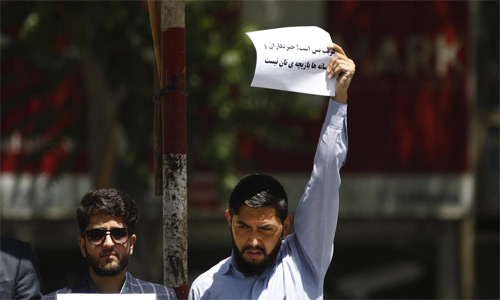Journalism considered as one of the top ten high-risky jobs in the world; journalists knowingly they pay their precious lives to gain liberty for their nation. Despite numerous challenges, they work in the worst working conditions for information and freedom of expression. In Afghanistan, in additions to restrictions, humiliation, threats and job insecurity, they made countless sacrifices for the realization of freedom of expression, but now it seems that Afghan journalists are increasingly resorting to self-censorship due to fear that their reporting could be punished by the violence of armed unarmed groups. Even the Taliban has recently warned Medias for releasing reports against them.
However, Afghanistan lies in a good status in term of media freedom comparing to some regional countries. Indeed, it is one the greatest achievements of post-Taliban era. The country has never had more news outlets than today as there are hundreds of print media, tens of television stations, hundreds of radio stations and dozens of news agencies. Firstly, the credit of this achievement goes to Afghan young journalists who successively sacrificed their lives in this way. Secondly, Afghans are grateful to the initial sincerity of international community when toppled the enemy of freedom in 2001, but hope to act up their commitments accordingly.
During Taliban regime, there was one radio station called Vice of Sharia, it was used to broadcast propaganda of the Taliban insurgent only. After Taliban regime had toppled, the new government under administrative of ex-president Hamid Karzai, provided opportunity to establishment of numerous media outlets in the country. According to Afghan Constitution Article 34, “Freedom of expression shall be inviolable. Every Afghan shall have the right to express thoughts through speech, writing, illustrations as well as other means in accordance with provisions of this constitution. Every Afghan shall have the right, according to provisions of law, to print and publish on subjects without prior submission of state authorities. Directives related to the press, radio, and television as well as publications and other mass media shall be regulated by law.”
Nevertheless, Taliban is considered of the great enemies of media freedom in Afghanistan. In 2016 Afghanistan got position of the second most dangerous country for reporters in the world after Taliban killed at least 13 journalists and dozens wounded. Perhaps the Taliban seek to target civilians and media staff to put pressure on the government since their militant fighters sustain heavy casualties on civilians recently. From one hand, targeting non-combatants shows the weakness of the group, and on the other hand, it always caused the public anger and hatred against them.
Thus, in, 2017 and 2018, dozens of journalists lost their lives in Afghanistan, more than anywhere else in the world. According to a report, violence against journalists was increased by 22% over the first six months of 2018. Almost all of them were killed while performing their duties as journalists. Having waged a hard-fought struggle for media freedom after the fall of the Taliban regime in 2001, Afghan journalists now find their human rights under relentless assault. The Taliban and other armed groups have escalated their threats and violence. Meanwhile, some of the local self-styled standard-bearer of press freedom – has also imposed its own restrictions.
In 2019, the latest act of violence against media was closure of Samaa radio station by a local Taliban commander. However, according to report, this was the third time that Samaa radio station had been forced to stop its operations in the past four years. Even as the Taliban pursuing peace, it has once again singled out journalists as targets. Ahead of the recent intra-Afghan dialogue in Doha, the Taliban’s military commission issued a statement warning journalists that it will consider them and their organizations “military targets” unless they stop issuing “anti-Taliban” statements and advertisements. Brazenly threatening to carry out crimes under international law, the armed group alarmingly warned that journalists or employees of media organizations “will not be safe.”
Therefore, the international community is expected to show a serious reaction to the Taliban’s message of threat to media staff and put pressure on them to stop targeting journalists and civilians. Targeting media staff is a war crime. The media staff continues their responsibility with impartiality, and they are simply reporting and reflecting the news through the power of their pens and lenses of their cameras. Hence, they have nothing to do with the conflict except for reporting.
Meanwhile, the government should prosecute all cases of violence and crimes against the media and journalists in Afghanistan – particularly the cases where state officials are the suspects of the crimes. Moreover, the Protection of media freedom and the right to freedom of expression must not be undermined by any peace talks, and require to be respected, protected, promoted and strengthened. The Taliban must stop targeting and attacking the media and journalists in Afghanistan, and Afghan journalists must be allowed to do their important work freely and without fear.
Taliban will not be able to restrict the freedom anymore. A large number of the youth are engaged on social media and they are able to spread news and reflect the Taliban’s terrorist activities this way. Thus, targeting journalists will not be in their interests. In addition, the Taliban should understand that the media do not only report about them but also monitor the government and report the corruption and any activities going on within the government. The government and officials are criticized severely by the public and writers through the media. After all, the media also interview the Taliban’s leaders and provide a platform for them to have their say. Lastly, the media are also expected to report about all layers of the society in a fair and impartial way.
Home » Opinion » Ups and Downs of Journalism Freedom in Afghanistan
Ups and Downs of Journalism Freedom in Afghanistan
| Mohammad Zahir Akbari

